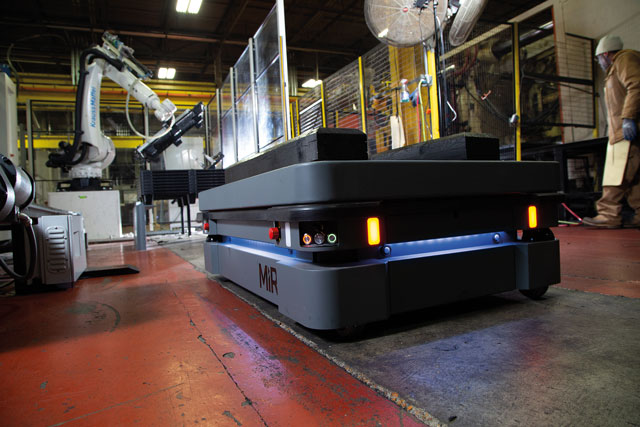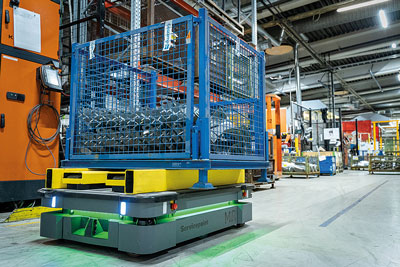Autonomous mobile robots create their own maps of their surroundings, avoid people and obstacles and calculate the quickest route between two points, helping to speed up shopfloor workflow, says Ross Lacy, mobile robot product manager, RARUK Automation.


Even highly automated manufacturing sites still use skilled workers to push carts manually, transport pallets on forklifts and rely on rigid, inflexible systems such as line-guided AGVs or conveyors. However, increasingly such traditional logistic systems are being challenged by the more sophisticated, flexible and cost-effective technology of autonomous mobile robots (AMRs).
Industry 4.0 and the internet of things (IoT) are paving the way for manufacturers to move to customised and flexible working. AMRs, which are designed for collaborative working, complement this trend. Unlike automatic guided vehicles (AGVs), which are guided by wires, magnetic strips or sensors, an AMR navigates via maps constructed by software on site using its laser scanners. It is therefore easy to change the map in line with changing factory layout.
The robots are able to calculate the fastest route from A to B, and if they encounter obstacles they re-route or call for help. AMRs make sure materials are delivered on time to and from the production floor to reduce bottlenecks and waiting time.
Good for employees
Labour shortages and the need to be as competitive as possible are driving companies to focus on employees performing higher value and safer jobs, leaving AMRs to undertake the monotonous task of goods transportation.
AMRs are designed to work side by side with people. They will always avoid obstacles, including people, and stop if they get too close. With an easy, intuitive interface, AMRs can be programmed and operated without previous experience, which empowers employees to learn how to perform this task.

Fast return on investment
Easy integration – and the fact that companies do not need to make changes to the existing factory layout when integrating AMRs – make them a comparatively low-cost investment. AMRs can run for 8-10 hours before recharge and charge automatically when they have no task to perform, contributing to a smooth workflow and optimising internal logistics.
These benefits, and the potential to free full-time employees to perform high-value tasks, makes the payback period of an AMR typically less than a year.
The latest model in the RARUK Automation MiR fleet of AMRs is the MiR250. It’s an agile, rapid-charging, cost-effective means of transporting payloads of up to 250kg around factories and warehouses for any business seeking to automate its internal logistics. Its compact dimensions enable it to move under objects, navigate in narrow spaces and through doors just 800mm wide, and take corners quickly.
The MiR250 is suitable for use in harsh industrial environments because several standard components have been replaced with heavy-duty counterparts, extending life expectancy. The number of hours the robot can operate in a given period has been increased, mainly because the MiR250 can be charged twice as quickly as the company’s other small mobile robots. This capability corresponds to an extra three hours of operation in each 24-hour period for a robot that operates around the clock, helping to streamline logistics operations even more.
Like all robots in the company’s range, the MiR250 is designed to function in collaboration with people without external safety measures. For this reason, the device is equipped as standard with more safety functions than any other type of mobile robot.
For those looking for a fleet of mobile robots to streamline workflow even further, additional robots can be added with ease, via shared data between robots. Moreover, traffic flow between robots is co-ordinated efficiently.
The open platform of the MiR250 allows it to be customised with different top modules, such as the new MiR Shelf Carrier. This standard module is an anchoring device that enables the MiR250 to collect and deliver shelves, carts and other items.
www.rarukautomation.com | Email: automation@raruk.com
phone: (0)1462 670044

